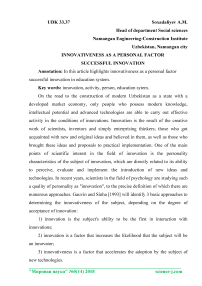Innovativeness as a personal factor successful innovation
Автор: Soxadaliyev A.M.
Журнал: Мировая наука @science-j
Рубрика: Основной раздел
Статья в выпуске: 5 (14), 2018 года.
Бесплатный доступ
In this article highlights innovativeness as a personal factor successful innovation in education system.
Innovation, activity, person, education sytem
Короткий адрес: https://sciup.org/140263638
IDR: 140263638
Текст научной статьи Innovativeness as a personal factor successful innovation
On the road to the construction of modern Uzbekistan as a state with a developed market economy, only people who possess modern knowledge, intellectual potential and advanced technologies are able to carry out effective activity in the conditions of innovations. Innovation is the result of the creative work of scientists, inventors and simply enterprising thinkers; those who got acquainted with new and original ideas and believed in them, as well as those who brought these ideas and proposals to practical implementation. One of the main points of scientific interest in the field of innovation is the personality characteristics of the subject of innovation, which are directly related to its ability to perceive, evaluate and implement the introduction of new ideas and technologies. In recent years, scientists in the field of psychology are studying such a quality of personality as "innovation", to the precise definition of which there are numerous approaches. Gauvin and Sinha [1993] will identify 3 basic approaches to determining the innovativeness of the subject, depending on the degree of acceptance of innovation:
-
1) innovation is the subject's ability to be the first in interaction with innovations;
-
2) innovation is a factor that increases the likelihood that the subject will be an innovator;
-
3) innovativeness is a factor that accelerates the adoption by the subject of new technologies.
According to Grewal, Mehta and Kardes [2000], as well as Larsen and Wetherbe [1999], innovation implies the subject's ability to draw ideas from outside the system and bring them inside, and also the ability to effectively represent these ideas. Robinson, Marshall and Stamps [2005], as well as Roehrich, [2004]; Schillewaert [2005] distinguished a number of personality factors that affect its main parameters, among which: the need for stimulation;
-
• the desire for novelty;
-
• Sensitivity to contradictions, new experiences and original ones, unlike other incentives;
-
• propensity to take risks;
-
• Creativity;
-
• readiness to process information;
-
• independence of judgments;
-
• openness to experience;
-
• Awareness, etc.
Scientific analysis of innovation implies its study as a personal characteristic of the subject, including the study of cognitive, motivational and emotional components. Features of the formation, functioning, manifestation and development of personal innovativeness in many ways determine the style of behavioral manifestations of the subject in the constantly changing economic, technological, information, socio-political and other parameters of the modern world. Thus, E. Rogers within the framework of the theory of diffusion of innovations carried out the typology of subjects of innovation activity, depending on the degree of their involvement in the process of introducing and implementing new ideas, solutions and technologies. He singled out:
-
• Innovators who are inclined to take risks for innovation;
-
• Early consumers, generally accepting innovations without any delays;
-
• late mass consumers, represented mainly by skeptics;
-
• sluggish and "late", who are often conservatives.
Within the Harris and Horne classification [1999], all participants in the innovation process are divided into:
-
• Innovators, most actively accepting new ideas and technologies;
-
• imitators who follow fashion trends, traditions and opinions of the majority and "repeaters" who tend to repeat once-made choices several times.
Due to the fact that consumers of innovation can be both individuals and social systems, for a more complete and detailed analysis of innovation, it is necessary to carry out its study at the following levels:
-
• Individual (personal),
-
• organizational,
-
• group,
-
• Sociocultural.
Studying the innovativeness of the individual will create the opportunity for accelerated implementation of innovative projects in the sphere of economy, education, healthcare, ecology, culture, etc. Effective implementation of long-term plans related to the creation of innovations and stimulation of innovative thinking of the active participants in the innovation process, and so But those who will carry out this activity in the future will be advisable if the training of personnel will be accompanied by the conduct of psychodiagnostics, as well as sihokorrektsii personal qualities that affect the development of innovation.
Список литературы Innovativeness as a personal factor successful innovation
- Programm of 2018 year "Proactive Entrepreneurship, Innovative ideas and technologies".
- ziyonet.uz


